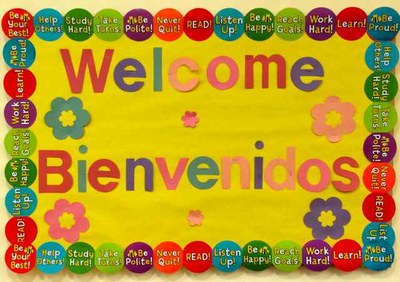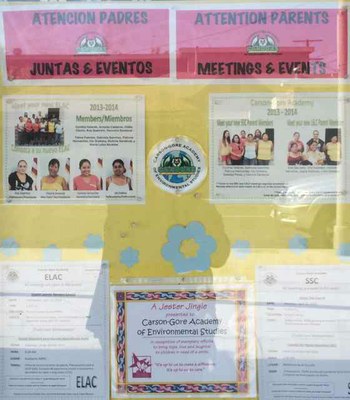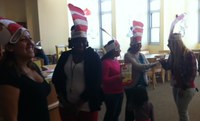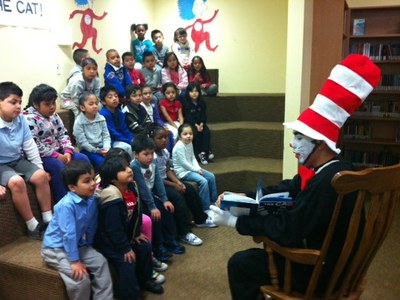Building Agency through School Community Events
“Unless someone like you cares a whole awful lot, nothing is going to get better. It’s not.” – Dr. Seuss, The Lorax
 Overview
Overview
I can’t remember a single instance of my own parents involving themselves with my schools. They attended parent conferences and awards assemblies readily enough, but neither my mother nor my father was a part of campus parent groups.
As a teacher I had always worked to maintain a welcoming and vibrant classroom environment, my parent conferences always included refreshments, and my status as a bilingual Spanish speaker ensured easy communication with my students’ parents. As a Categorical Programs advisor, however, the scope of my environment widened to encompass the whole school. Parent involvement had moved beyond classroom volunteering and conferences, and juice and cookies wouldn’t cut it anymore – or at least, not at the quantities that I was used to purchasing.
I had to get parents to invest in the school and not just their child’s classroom, but how to get parents to that level?
In Field of Dreams, Kevin Costner plays the role of Ray Kinsella, an Iowa corn famer who begins hearing a mysterious voice whispering, “If you build it, he will come.” Costner’s character interprets that as a directive to build a baseball field on his land, which he does, and is then surprised by the appearance of the Chicago Black Sox players.
Well, I may not have heard the disembodied voice of a slightly notorious baseball legend, but never the less I, like Costner’s character, felt compelled to build something so that parents would come. Fortunately the professionals had already built the school, and it became my duty to build a welcoming environment, a type of construction more suitable to my skills than the actual construction of a school, and the construction of a baseball field.
 The school’s main office and main entrance were the first places to get a make over. The outside bulletin board would become the main means of communicating the dates of important council meetings. Inside the main office we would decorate the bare walls with student and family centric information. Three of the four bulletin boards centered on the school’s attendance, reclassification of ELLs, and test performance, the fourth would consist of opportunities for and pictures of parent and family involvement with the school. The bulletin boards mounted around the campus would receive similar aesthetic treatments, particularly the board outside of the school’s Parent Center.
The school’s main office and main entrance were the first places to get a make over. The outside bulletin board would become the main means of communicating the dates of important council meetings. Inside the main office we would decorate the bare walls with student and family centric information. Three of the four bulletin boards centered on the school’s attendance, reclassification of ELLs, and test performance, the fourth would consist of opportunities for and pictures of parent and family involvement with the school. The bulletin boards mounted around the campus would receive similar aesthetic treatments, particularly the board outside of the school’s Parent Center.
That done, I felt that I had “built it” and parents did come. The issue then became one of parent capacity and agency. I worked tirelessly with the help of the Parent Representative to train and inform parents of their rights and power at the school through participation in the ELAC and SSC.
But still, there was more to do.
When the school first opened, I worked alongside another teacher to establish the school’s participation in the Reading is Fundamental of Southern California book give away. That first year, it was just my partner and myself developing literacy events and coordinating the two book events. The following year, I strove to involve parents in the effort.
I began by asking parents what they felt comfortable contributing, and after some discussion, it was decided that they would decorate the venue for the give away. By the second event of that year, I was collaborating with parents not only in a decorating capacity, but having them involved in the give away itself. Parents became an integral part of the event: they would hand out stickers and book marks, read aloud to the children, help them select a book, and some even volunteered to dress up in costumes depending on the theme (at the time of this publication, we have had parents dress up as Clifford, The Cat in the Hat, and Santa Claus). I provided them with refreshments and lunch after the end of the event.
My efforts didn’t end there. I noticed a particular parent was consistently present and invested in the success of the events, and so I asked her if she would like to become more involved. She was delighted, and so I invited her along to the Reading is Fundamental warehouse where the books are picked up for distribution, and had her help me write up the reports of the events that are required by Reading is Fundamental.
This year I made sure that same parent attended the Reading is Fundamental training along with myself, and I am overjoyed to report that she is now the point person, and running the events on her own.
Key Responsibilities
- Develop and manage an aesthetically pleasing and welcoming school façade, main office setting, and bulletin board spaces across campus
- Communicate school events through a variety of avenue: website, marquee, flyers, phone calls, etc.
- Meet weekly with Parent/Community Representative to plan and coordinate school events and parent workshops
- Acknowledge parent volunteers: certificates and recognition assemblies
- Encourage parent participation by providing them with opportunities to help: RIF, Fall Festival, Fundraising, etc.
Reflection
As a transformative leader, I must endeavor to establish a school culture in which all stakeholders understand the value of a collective community of learners--one in which parents aren't just involved but wholly engaged and adding to the value of our school community.
My experience working with parents has solidified my belief that parent engagement is more than just flyers sent home along with homework. It has opened up opportunities for more parent involvement with fundraising efforts, and community-building events.
As much influence as teachers have over a student’s achievement, there is no doubt that parents wield a sizeable amount of power and influence over their children’s success as well. It then falls to the school to establish means to involve parents in their child’s education at home and at school.
The district has established several organizational bodies – English Learner Advisory Committee (ELAC), Compensatory Education Advisory Committee (CEAC), School Site Council (SSC) – to include parent voices in school decisions. It falls to the Categorical Advisor and the administration to run the elections for the governing boards of these committees, the training of the individuals elected, and the collection/maintenance of meeting minutes.
It is up to individual schools, however, to ensure parent buy-in and participation in these organizations, and in the school community at large.
CPSEL Connection
Standard 1 - A school administrator is an educational leader who promotes the success of all students by facilitating the development, articulation, implementation, and stewardship of a vision of learning that is shared and supported by the school community.
Standard 2 - A school administrator is an educational leader who promotes the success of all students by advocating, nurturing, and sustaining a school culture and instructional program conducive to student learning and staff professional growth.
Standard 3 - A school administrator is an educational leader who promotes the success by ensuring management of the organization, operations, and resources for a safe, efficient, and effective environment.
Standard 4 - A school administrator is an educational leader who promotes the success of all students by collaborating with families and community members, responding to diverse community interests and needs, and mobilizing community resources.
Standard 5 - A school administrator is an educational leader who promotes the success of all students by modeling a personal code of ethics and developing professional leadership capacity.
Standard 6 - A school administrator is an educational leader who promotes the success of all students by understanding, responding to, and influencing the larger political, social, economic, legal, and cultural context.
Supporting Documents
- Book Event Report Completed by Parent
- Event Schedule Developed by Parent

